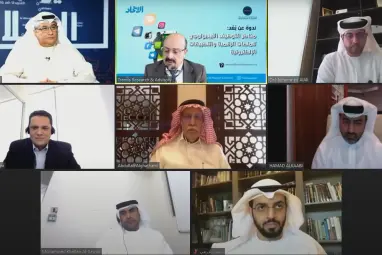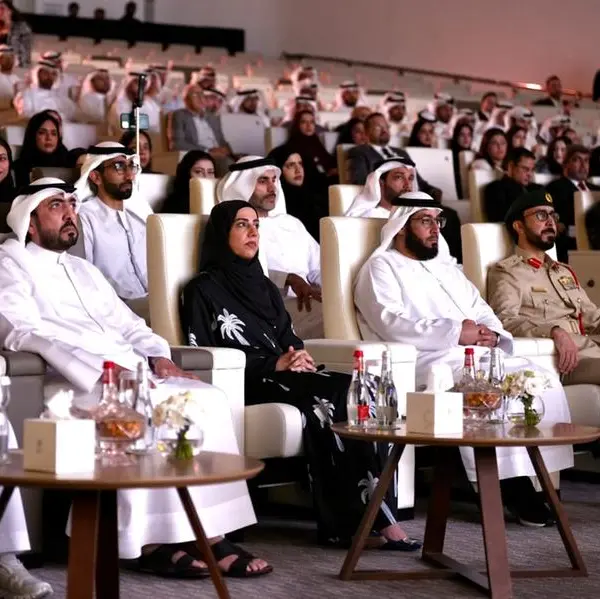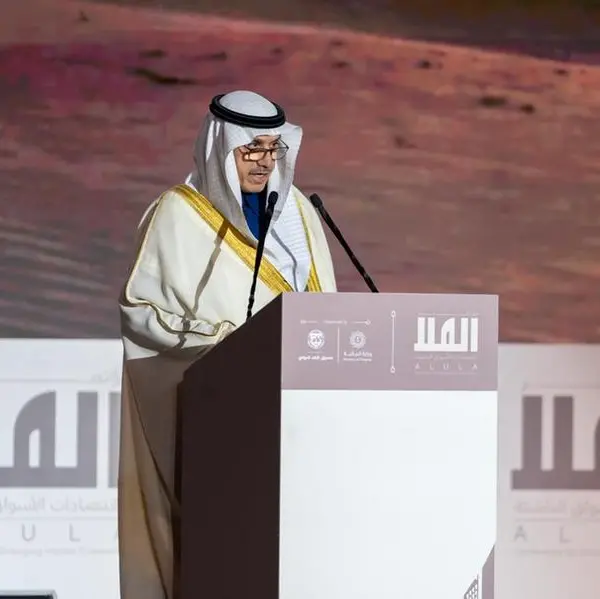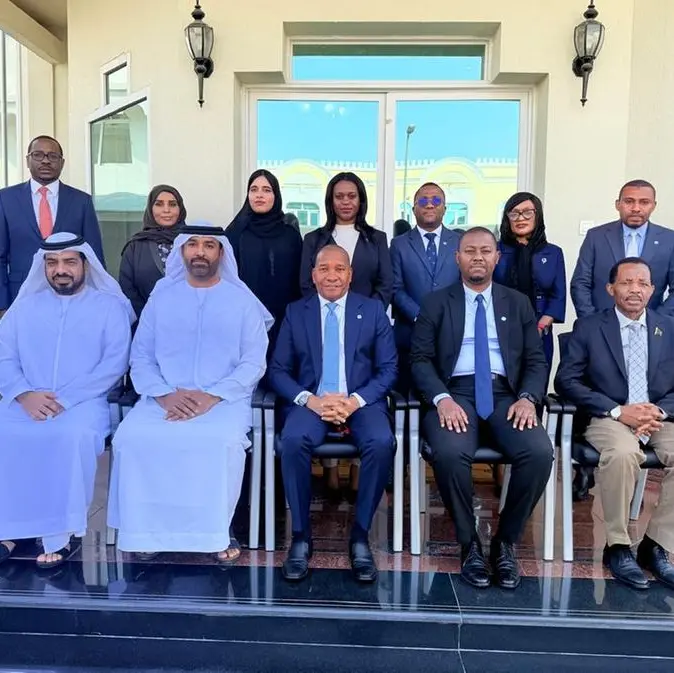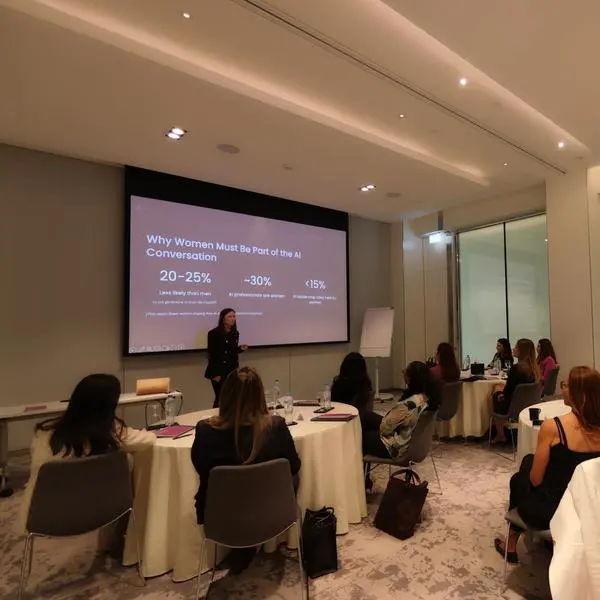PHOTO
ABU DHABI – An elite panel of experts from across the region took part in an e-symposium organized recently, highlighting the role of digital platforms and apps in shaping public opinion trends on vital issues of concern worldwide. They emphasized that digital platforms have become a haven for extremists and ideologists who employ them to hijack religion and incite extremism and hatred.
Hamad Al-Kaabi Editor-in-Chief of Al-Ittihad newspaper, UAE, delivered the welcoming remarks during the Al-Ittihad Ramadan Majlis Symposium, held in partnership with TRENDS Research & Advisory.
Al-Kaabi said there are about 4.2 billion social media users worldwide, and these platforms are a magnet for extremist forces and groups to exploit them. “The most effective weapon in facing this threat is to educate the masses and fortify their perception about anyone trying to exploit these platforms to destabilize societies,” he said.
Dr. Mohammed Al-Ali, Board Chairman & CEO of TRENDS Research & Advisory, said that digital platforms and electronic applications have revolutionized the new media and reinforced its role in shaping public opinion on vital issues of concern worldwide.
“The Muslim Brotherhood and other political Islam movements & extremist organizations have misused digital platforms and exploited them to incite violence, hatred, and hostility,” he said. Dr. Mohammed Al-Ali said that it is the responsibility of the international community to address the risks emanating from the misuse of digital platforms by extremist groups.
“Global agencies involved in counter-extremism efforts should join their efforts to safeguard societies from the threat of the ideological misuse of digital platforms and electronic applications,” said Dr. Mohammed Al-Ali.
Abdullah Al-Ghutami, Professor of Criticism & Theory at the King Saud University, Saudi Arabia, said the ability of official institutions to confront social media abuse is minimal. One can recall the US elections to see how they were subjected to outside interventions.
Highlighting the smear campaigns and linguistic platitudes, Al-Ghutami stressed that we should not address every article published on social media unless the post is viral. “Also, the articles should be confronted with the law and documentary responses and scientific facts on the other hand,” he said. According to Al-Ghutami, enhancing societal cohesion and harnessing societal forces are essential weapons in confronting the harmful practices of social media that seek to destabilize and destroy countries.
Muhammad Al-Mulla, Media Advisor to the Kuwait Journalists Union, expressed his views on The Muslim Brotherhood: From Euro-Fatwa to Clubhouse. He said that the media is an important tool for the Muslim Brotherhood in spreading misguided ideas among the youth to destabilize nations’ security and promote fatwas (edicts) that call for violence to control states and societies.
“The Muslim Brotherhood took advantage of traditional media tools to spread their ideas, such as the Clubhouse application to hold meetings, conduct discussions, and implant destructive ideas among the youth,” he said. Al-Mulla recommended that media professionals, writers, and journalists enter old and modern social media applications and respond to the Brotherhood’s lies and allegations.
“The media plays an important role in confronting the hate speech propagated by the Muslim Brotherhood. There is a need to build awareness of the danger this group can promote among people,” he said.
Mohammed Al-Sawafi, Director of the Parliamentary Media Department, Federal National Council, UAE, also addressed the symposium, citing the example of ISIS spreading extremist ideology over “cyber caliphate.”
Al-Sawafi said that ISIS resorted to electronic platforms to communicate with its members and urge them to carry out individual terrorist operations after the organization suffered painful strikes in Syria and Iraq. “After the collapse of ISIS and its dream of establishing a caliphate, the organization began to virtually regain its momentum by exploiting social media, the most recent of which is the Club House application,” he said.
“The “Syriac caliphate” that ISIS sought to establish in virtual reality represents a real danger as it uses it to communicate between its members, recruit new elements, and achieve intellectual expansion,” Al-Sawafi said.
Dr. Mohammad Al-Asoomi, Consultant & Economist, UAE, highlighted the critical subject of the commercialization of personal data and consumer trends manipulation. “Some commercial and financial institutions violate the privacy of those dealing with their electronic applications, which leads to their leakage to terrorist organizations that pose a threat to the lives of these individuals,” Al-Asoomi said.
He also said that the value of the fraud, electronic fraud, and breaching bank accounts and credit cards had risen globally, from $60 billion in 2017 to $65 billion in 2020. “Confronting cyber fraud requires increased security measures and vigilance on the part of individuals, and the launch of applications and counter platforms in social media,” he said.
Dr. Omar Al-Darei, a Member of the UAE Shari’ah Ifta Council, UAE, emphasized the role of educational institutions in this struggle against online extremism. He said that digital platforms had become a haven for extremists and ideologists, employing them to hijacking religion and inciting extremism and hatred.
“Social media has become an essential receptacle for extremism content and a tool for promoting it. Many studies confirm that extremism has crowded others into the battle over these means and is about to win,” Al-Darei said. He also said that society members in general and youth, in particular, should be made aware of the dangers of misleading information that extremist groups spread.
Dr. Ashraf Al-Eisawi, Media Advisor at TRENDS Research & Advisory, UAE, focused on the role of educational and media institutions in tackling the threat posed by digital platforms. “The media plays an important role in exposing the falsehood of the delusive thought that extremism and terrorism groups seek and at the same time work to consolidate the values of coexistence, tolerance, and acceptance of the other,” Dr. Al-Essawi said.
He also emphasized educational institutions’ role in exposing the falsehood of educational materials that extremism and terrorism movements spread and promote, especially among the youth, and to work on immunizing them against extremist ideas and destructive ideologies.
“The important role played by educational institutions is not only limited to educating students about the phenomenon of extremism and terrorism but also working to strengthen the system of positive values they have,” Dr. Al-Essawi said. Dr. Mohammed Al-Ali, Board Chairman & CEO of TRENDS Research & Advisory, thanked all the panelists in the E-Symposium.
© Press Release 2021
Disclaimer: The contents of this press release was provided from an external third party provider. This website is not responsible for, and does not control, such external content. This content is provided on an “as is” and “as available” basis and has not been edited in any way. Neither this website nor our affiliates guarantee the accuracy of or endorse the views or opinions expressed in this press release.
The press release is provided for informational purposes only. The content does not provide tax, legal or investment advice or opinion regarding the suitability, value or profitability of any particular security, portfolio or investment strategy. Neither this website nor our affiliates shall be liable for any errors or inaccuracies in the content, or for any actions taken by you in reliance thereon. You expressly agree that your use of the information within this article is at your sole risk.
To the fullest extent permitted by applicable law, this website, its parent company, its subsidiaries, its affiliates and the respective shareholders, directors, officers, employees, agents, advertisers, content providers and licensors will not be liable (jointly or severally) to you for any direct, indirect, consequential, special, incidental, punitive or exemplary damages, including without limitation, lost profits, lost savings and lost revenues, whether in negligence, tort, contract or any other theory of liability, even if the parties have been advised of the possibility or could have foreseen any such damages.
